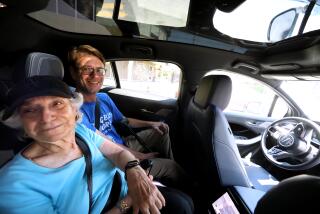Being Taken for a Ride : Passengers Who Use Taxis to Make Drug Pickups Are Putting Cabbies in a Quandary
- Share via
In the streetwise jargon of night-shift taxi drivers, “going on a geological” means taking a passenger to buy crack cocaine. Or they call it “doing a corner shot” because often the deal is done quickly on a dark corner while the cab waits.
Although drivers know the practice is dangerous--and illegal if the driver does it knowingly--drug-buying runs have increasingly become part of the daily routine for taxi drivers throughout the San Fernando Valley and the rest of Los Angeles.
Police say the problem is not great, but some taxi drivers say they are requested to make drug runs at least once a day.
Cabs that exclusively serve upper-income communities or an airport are rarely, if ever, used for a drug transaction. But drivers who work the seamier streets of the city during late hours say transporting buyers and sellers for drug transactions is almost a rite of passage for new colleagues.
“All cabbies have been stiffed four or five times by a crack guy,” said one bearded night-shift driver who identified himself only as Murphy.
For the buyer, often strung out or high, taxis eliminate some of the stress of making a drug buy because the driving is left to someone else. For the driver, however, drug runs present a difficult problem because taxis are forbidden by city law to refuse giving rides except under limited circumstances.
Suspecting that a passenger will do something illegal isn’t one of those conditions--the driver has to have evidence that he is indeed helping to commit a crime.
“If you have definite reasons to believe you are on a drug run, you can refuse,” said Bob Martin, past president of the Independent Taxi Owners Assn. of Los Angeles. “But if you do refuse, you better make sure you have a good reason.”
Still, many drivers say they routinely refuse passengers they suspect are looking to make a drug purchase.
“Technically, I can’t refuse to take a drug buyer,” said Mark, a retired accountant who has been a taxi driver in the Valley for two months. “But then again, I don’t think they’ll complain.”
(Like most of the dozen or so drivers interviewed for this story, Mark asked that his full name not be published.)
Police and officials from the Los Angeles Department of Transportation, which regulates taxis in the city, acknowledge the problem but say it is not serious enough to warrant special attention.
“I have known three or four dope dealers who regularly use taxis to make drug deals,” said Los Angeles Police Detective Joe Stanley, an investigator in the Valley Bureau’s street narcotics unit. “But it’s not a regularly occurring problem.”
Kenneth Cude, head of the Department of Transportation’s taxi unit, said there is a problem, but it is low on their priority list. “We are aware of it but we have limited resources, like the police,” he said.
The city’s Board of Transportation Commissioners regulates licensed taxi operations and has the power to revoke a driver’s permit for violating city laws. Among those is the regulation that forbids taxi drivers to refuse to carry a passenger unless the driver feels threatened by the passenger, believes the passenger has no ability to pay or fears the passenger will soil the interior of the cab.
In addition, however, cabdrivers are prohibited from knowingly transporting illegal drugs or giving passengers information on where to buy drugs. The license of a driver found guilty of violating any of these conditions can be suspended or revoked.
“Everything is a judgment call in this business,” said a silver-haired driver wearing a red jacket.
Alan Willis, a senior transportation engineer in the city’s taxi unit, said some taxi operators have requested that the regulations regarding driver conduct be revised to give drivers more leeway to refuse passengers they suspect of being drug buyers. But the city is sticking with the present rules to keep taxi drivers from discriminating against passengers, he said.
Drivers and police say that drug buyers prefer to use non-licensed taxis, or “bandit cabs,” because they have lower fares and usually are more willing to operate in high-crime areas. In July, a small charter company called Super Car went out of business when the state Public Utilities Commission revoked its charter carrier permit, and the company sold its phone lines to a Burbank-based taxi firm. But taxi drivers and representatives of Super Car said some of the company’s former drivers owned their own taxis and went into business as bandit cabs.
For licensed taxi drivers, “corner shots” and “geologicals” represent a moral dilemma that pits the need for more business against distaste for being a part of a drug deal.
Many cabdrivers say they often suspect they are participating in a drug transaction but accept it because they would lose money otherwise.
“If you have a lease to pay and bills to pay, what are you going to do?” asked Bob, a rotund, bespectacled man who has driven a cab for about five years. “You can’t refuse.”
“We should all refuse them but at this point we can’t afford to,” said Murphy, a self-described former hippie who said he “knows more about drugs than I should.”
Murphy said there is little danger in participating in a drug transaction unless the deal goes awry and the driver is caught in the middle. “They are as safe as children,” he said. “All they care about is getting the pipe.”
He added that some passengers going on drug buys have given him TV sets and videocassette recorders in exchange for the ride. “They start out having cab fare and a few days later they have nothing.”
Karen, a friendly blonde who has been a cabdriver for 2 1/2 months, said she didn’t realize she had participated in a drug transaction until her husband, a veteran taxi driver, explained it to her later.
Several weeks ago, she said, two men boarded her taxi at an apartment complex in Panorama City and asked to be taken to several locations and then returned to the complex. At each stop, one of the men got out and returned after several minutes, she said. At the final stop, both men exited the cab and never returned to pay the $21 fare, Karen said. When she got home, she told her husband the story.
“He said, ‘Honey, they were doing a drug buy,’ and I said, ‘Oh,’ because I was really naive.”
Taxi drivers say they suspect a passenger wants to make a drug buy when he says he wants to make a round-trip and stops several times to “pick up a set of keys” or “make a phone call.” Drivers are also suspicious when a passenger asks to stop in an area known for drugs.
“We all know where these corners are. You learn them fast in this business,” said Belle Markovitz, who has driven a cab in the Valley for a year and a half. She estimates she has driven 30 to 40 drug buyers to make purchases.
Another cabdriver who declined to give his name agreed. “You have certain locations and certain areas” where buys are made, he said. “You can’t prove it but you suspect.”
Stanley, the police narcotics investigator, said most drivers recognize when they are being used to make a drug buy. “It doesn’t take a brain surgeon to know what is going on,” he said.
But when business is slow, taxi drivers say they turn a deaf ear to what their passengers are up to.
“As far as I’m concerned, I’m a hired driver. They do what they want,” said a clean-cut young driver parked in front of the Flyaway bus station in Van Nuys.
“A lot of times they’ll smoke it in the cab,” said another driver who declined to give his name. “They can’t wait.”
The only precaution many cabdrivers take is to ask for the fare first so that passengers don’t spend all their cash on the deal.
Said Karen: “When they say it’s a round-trip, you better get the money upfront, because you will be stiffed.”
More to Read
Sign up for Essential California
The most important California stories and recommendations in your inbox every morning.
You may occasionally receive promotional content from the Los Angeles Times.














